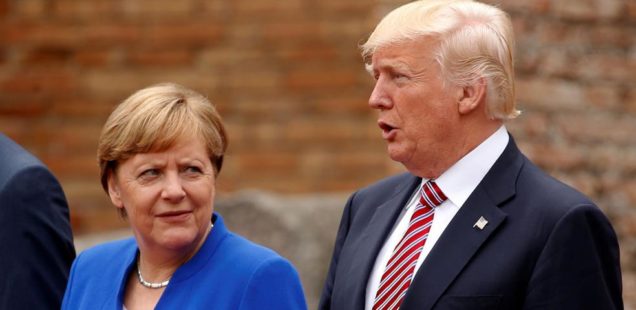
As Trump Abdicates Global Leadership, Europe Moves to Fill the Vacuum
ROME—Donald Trump has Europe quaking. His performances at the NATO and G–7 summits last week have left the Continent more uncertain of its trans–Atlantic ties than at any time since the early postwar years.
From Paris to Berlin to Rome, Europeans—and their leaders—are suddenly asking whether the era of American leadership just came to an abrupt, unexpected end. That’s a very big question. But intentionally or otherwise, the president, whose theme is “America First,” has brought the Atlantic alliance to what looks like an historic turn.
Related: What the US Is Losing as Trump Insists on ‘America First’
You find a collective schizophrenia everywhere. On the one hand, a desire to set a more independent course for themselves has been evident but submerged among Europeans since the Cold War decades. Trump brought this impulse to a full boil last week.
On the other, the U.S. has led the Western alliance since 1945, and nobody in power today has any memory or experience of anything else. The thought of going it alone plainly makes the Continent nervous.
“Europe without the USA?” Corriere della Sera asked anxiously on Thursday. “It’s a risk for both sides.” That’s for sure. But as the big Milan daily added, Trump turned the NATO meeting and the Group of 7 Summit into “disasters—this by what he said and how he behaved.”
The core issues include the Paris Accord. Europeans consider it essential to counter climate change and like to believe they can act collectively despite the weakening of European unity. They’re wholly committed to the agreement. Trump demurred at the G–7 sessions, and today announced he would pull out of the agreement, despite pleas from business leaders, scientists, and environmentalists to reconsider.
Related: Trump Says the Trade Deficit With Germany Is ‘Very Bad’ – but Is It Really?
At the NATO meeting in Brussels, Trump continued to suggest that common defense—the alliance’s bedrock principle—is conditional: Pay up or don’t count on us, the president as much as said.
Trump blindsided all of Europe when he attacked Germany as “very bad” during his tour—a reference to the U.S. trade deficit with the federal republic. And he hasn’t stepped back despite the ensuing controversy. “We have a MASSIVE trade deficit with Germany, plus they pay FAR LESS than they should on NATO & military,” the president tweeted Tuesday.
All this seems to have made Angela Merkel, who has made her distaste of Trump plain since his election last year, the poster child of the opposition. “Recent days have shown me that the times when we could rely completely on others are over to a certain extent,” the German chancellor said in a speech in Berlin Tuesday. As Europe’s unofficial leader, Merkel was careful to identify herself as “a convinced trans–Atlanticist.” But in a remark that instantly ricocheted around the world, she added, “We Europeans must really take our fate into our own hands.”
Related: Does NATO Really Owe the US Money?
Merkel signaled a shift in sentiment that’s widely shared across the Continent. Nobody’s talking about a radical departure from the trans–Atlantic consensus, but Europeans have just told the president who wants to make America great again that they’re not prepared to acquiesce as they would have in past decades on issues such as collective defense and climate change.
As if on cue, Emmanuel Macron demonstrated what a more independent Europe would look like in concrete terms when he summited with Vladimir Putin at Versailles this week. The new French president was pointedly blunt, even harsh, in his remarks to and about the Russian leader. Famously sensitive about media coverage, Macron ripped into Putin for Russia’s “propaganda campaign,” as he put it, during the French elections. Wisely or otherwise, he drew the same “red line” Barack Obama did in Syria: Any future use of chemical weapons will trigger immediate retaliation.
While Macron pointedly set a tough tone, the substance of his position isn’t to be missed. He proposed a reset in relations with Russia based on a “frank and direct dialogue, but above all dialogue.” His punch line went straight to the point: “There are a lot of global issues that can’t be resolved without Russia.”
Related: 9 of the Oddest Moments from Trump’s First Foreign Trip
Macron was notably clear on two specific questions. He acknowledged the need to “preserve the Syrian state”—which means the Assad government at this point—and said the time’s right to restart stalled talks to resolve the Ukraine crisis. Reflecting the Obama administration’s all-over-the-place foreign policies, Washington’s views on both the Syria and Ukraine issues remain blurry: It’s for or against keeping Assad in place for the time being, for or not interested in new talks on Ukraine.
Macron is Europe thinking for itself. Trump has left the Continent feeling determined to do so because it suddenly must chart its own course.
But there’s no mistaking the anxiety—and even a measure of sadness. “The West has become smaller,” Sigmar Gabriel, Merkel’s foreign minister, said in Berlin this week. “It has become weaker, at least.”
The question now is whether Europe is reacting strictly to Trump, or whether the rift and drift evident across the Continent this week will remain after him.

